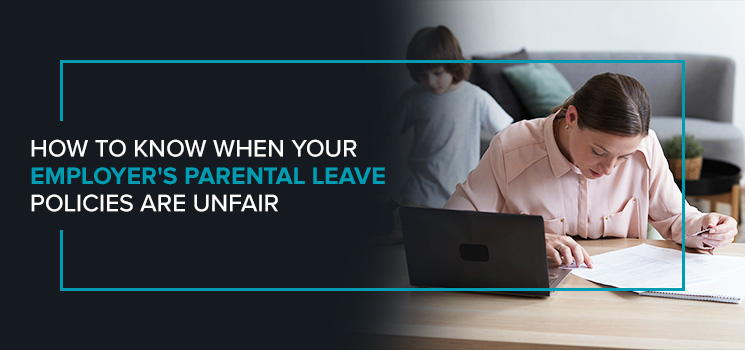



Becoming a parent is an unforgettable experience. You should treasure spending the early days with your child without worrying about when and how you will return to work and whether your employer will let you keep your job.
Ideally, your employer has fair and legal policies covering every base so you can fully enjoy your parental leave. Understanding what constitutes unfair parental leave policies makes a difference if you encounter paternity or maternity leave discrimination.
While federal law does not require private-sector employers to provide paid parental leave, it protects people’s jobs if they need to take time off for specific reasons. The Family and Medical Leave Act is a nationwide law that ensures workers 12 weeks of unpaid leave for medical or family reasons without risking their employment status. If your company offers paid parental time off, they must do so lawfully. Any of these factors would make an employer’s parental leave policies illegal.
Starting a new job or preparing for birth or adoption are excellent times to review your employer’s parental leave policy.
The FMLA has provisions for employers that offer paid parental leave. You can use these as guidelines for determining if your company’s parental leave policies are fair.
Most of the above points only apply if the FMLA covers your employer and you are eligible for FMLA benefits. To qualify for the FMLA, you should meet these requirements.
You should also familiarize yourself with Pennsylvania’s paid parental leave policy to determine whether you qualify.
While the FMLA is in place to protect you, you may feel your employer has disregarded the law somehow. Thankfully, you can take steps if you think your company is discriminating against you. You may have a legal case if your employer does any of the following:
Remember, your employer should not discriminate against you or your partner during pregnancy. If you face unfair treatment, including parental discrimination, consult an employment law attorney to determine if you have a claim under federal or state laws. Your attorney will advise you if you have a case and guide you through filing a claim. Your claim could make you eligible for compensation from your employer and may help you get reinstated if your company wrongfully terminated you.
If you plan to welcome a child into your family, you may have questions about taking parental leave.
A parent is anyone who cares for or financially supports a newborn baby, recent adoptee or foster care child. You may be eligible for parental leave if you are one of the primary people in this role.
Yes. However, remember that only one parent qualifies as the primary caregiver. Depending on state law or company policies, the primary and secondary caregivers may not be eligible for the same duration of parental leave.
It is illegal to deny paternal leave to a person who is eligible for leave under the FMLA’s guidelines. It is also against the law to deny a timely request for family leave in several states. If your company offers paid leave, it is unlawful for them to approve maternity leave and deny paternal leave.
The average maternity leave period differs according to several factors, including whether you qualify for family and medical leave, if your employer offers paid leave and what state you live in. Some companies only provide a few weeks of paid maternity leave, while others offer the full 12 weeks allowed by the FMLA.
If you think you have grounds for a claim for FMLA violations or discrimination from your employer due to your pregnancy or paternal leave, consult with the team at Weisberg Cummings. Our knowledgeable and helpful attorneys will review your case and provide the information and support you need.
Weisberg Cummings’ experienced lawyers can assist you with employment law in Pennsylvania and help you decide the way forward when you face workplace discrimination. Contact us online or call 855-716-2367 to request a free consultation.
Landing a new career opportunity is exciting after the job hunting, resume editing and interview…
Employers use several tactics to protect their interests. One common example is making workers sign…
The Americans with Disabilities Act (ADA) requires employers to make reasonable accommodations when employees with…
Most people spend significant time at work — that's the reality. Employment allows employees to…
Many of our clients come to us with the claim, “My employer is not paying…
Can a job fire you for calling out sick? The short answer is yes, your employer…